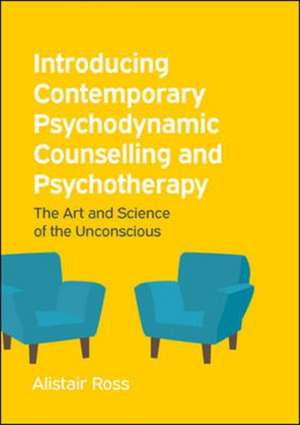Introducing Contemporary Psychodynamic Counselling and Psychotherapy: The art and science of the unconscious
Autor Alistair Rossen Limba Engleză Paperback – 7 iun 2019
Over the last 30 years, important new theoretical ideas, skills and clinical practices have emerged in counselling and psychotherapy. While key Freudian concepts like transference, counter-transference and the influence of the past on the present remain vital to psychodynamic work, research drawn from infant development, neuroscience, the role of the sacred, and intersubjective approaches to relationships has changed the way therapists understand and work with clients. Either in its own right or as part of an integrative approach, psychodynamic counselling and psychotherapy have an important role to play in developments to come.
The book’s features include:
• A re-discovery of the importance and relevance of Freud for present-day therapeutic relationships.
• An encounter with the breadth and depth of our understanding about, and experience of, the unconscious.
• An introduction to research that has evolved after Freud, revealing new ways of applying his ideas.
• A contemporary perspective on traditional counselling and psychotherapy skills, illustrated by vignettes and personal insights from Alistair Ross’s professional practice.
• An encouragement to develop new skills for relating at depth with our clients’ past, present and future, motivated by revealing how life-changing therapy can be.
This book is a must-read for trainee and practising (psychodynamic or integrative) therapists who want an overview of new thinking and practice or might benefit from greater insight into psychodynamic practice, applying Freud’s theoretical world to improving the lives of real people today.
‘It is good to see Alistair, a valued student of mine and now an equally valued colleague, taking up the torch for psychodynamic counselling and psychotherapy for a new generation. He has written a book that collates much of the valuable writing to date and at the same time adds new dimensions that should not be overlooked.’
Michael Jacobs, Visiting Professor, University of Leeds and Bournemouth University, UK
Preț: 230.49 lei
Nou
Puncte Express: 346
Preț estimativ în valută:
44.11€ • 47.90$ • 37.05£
44.11€ • 47.90$ • 37.05£
Carte disponibilă
Livrare economică 02-16 aprilie
Livrare express 18-22 martie pentru 26.20 lei
Preluare comenzi: 021 569.72.76
Specificații
ISBN-13: 9780335226825
ISBN-10: 0335226825
Pagini: 242
Dimensiuni: 168 x 237 x 11 mm
Greutate: 0.42 kg
Editura: McGraw Hill Education
Colecția Open University Press
Locul publicării:United Kingdom
ISBN-10: 0335226825
Pagini: 242
Dimensiuni: 168 x 237 x 11 mm
Greutate: 0.42 kg
Editura: McGraw Hill Education
Colecția Open University Press
Locul publicării:United Kingdom
Cuprins
PART ONE: Setting the scene
1. Introduction – The meaning of psychodynamic theory in therapy
2. Understanding the past – How did we get here?
3. Understanding the present – The role of research
4. Encountering the new – Meeting a dancing landscape
PART TWO: Meeting the unconscious
5. Who owns the unconscious?
6. The evolving unconscious
7. The implicit unconscious
PART THREE: How we develop
8. The infant unconscious – Oedipus, bad breasts, lines and stages
9. Learning from babies – Attachment, the interpersonal self and infant research
10. Learning from our brains – Infant development and neuroscience
11. Learning about sexuality, gender and identity
PART FOUR: Clinical perspectives
12. When life goes wrong – Introducing psychopathology and trauma
13. Foundational skills for practice
14. Developing skills for practice
15. Therapeutic engagement and the process of change
1. Introduction – The meaning of psychodynamic theory in therapy
2. Understanding the past – How did we get here?
3. Understanding the present – The role of research
4. Encountering the new – Meeting a dancing landscape
PART TWO: Meeting the unconscious
5. Who owns the unconscious?
6. The evolving unconscious
7. The implicit unconscious
PART THREE: How we develop
8. The infant unconscious – Oedipus, bad breasts, lines and stages
9. Learning from babies – Attachment, the interpersonal self and infant research
10. Learning from our brains – Infant development and neuroscience
11. Learning about sexuality, gender and identity
PART FOUR: Clinical perspectives
12. When life goes wrong – Introducing psychopathology and trauma
13. Foundational skills for practice
14. Developing skills for practice
15. Therapeutic engagement and the process of change
